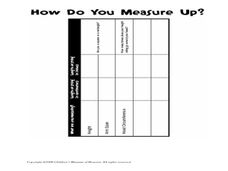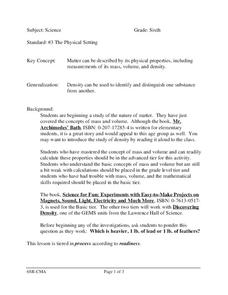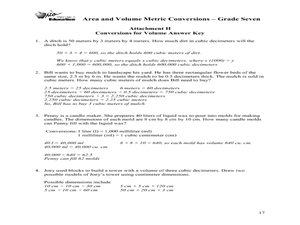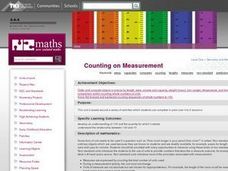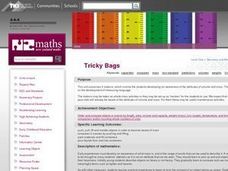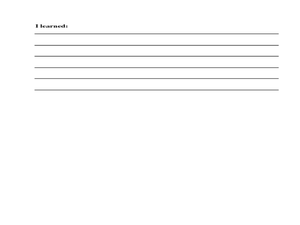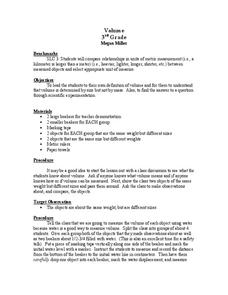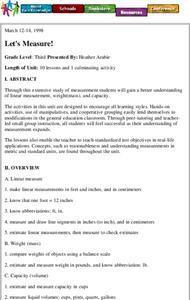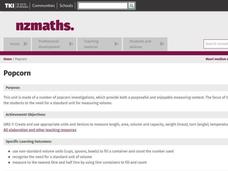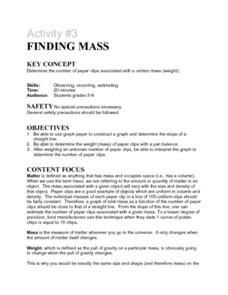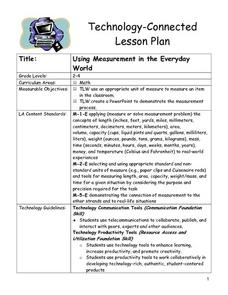Curated OER
Metric Conversions
Students measure an assortment of items using metric measurements. In this measurement lesson plan, students measure using length, mass, and volume units of measurement. They convert between units. Students learn a mnemonic to assist in...
Curated OER
How Do You Measure Up?
Students measure their body. In this measurement lesson plan, students use a string to measure their height and the circumference of their head. They record this information on the worksheet provided and answer questions as a group.
Curated OER
Measure Object Using English and Metric Systems
Students are able to measure various objects using English and metric systems within half of the smallest unit of the measurement device. Students identify units of length, volume, mass and temperature according to International System...
Curated OER
Physical properties of matter
Sixth graders find the physical properties of matter. In this matter lesson, 6th graders measure mass, volume, and density. Students are broken into 3 tiers with 3 different activities based on their understanding of mass and volume.
Curated OER
Displacement and Density
High schoolers explore displacement. In this displacement and density instructional activity, pupils find the volume of irregular shaped objects. Afterward, they determine the volume of containers. They compute the amount of water...
Curated OER
Chemistry Practice
For this chemistry overview worksheet, students calculated the volume of different gases and liquids given in a word problem. Students had to calculate the molecular mass and write the empirical formula and the molecular formula.
Curated OER
WS 7.4 Ideal Gas Law
In this ideal gas law worksheet, students solve eighteen problems using the ideal gas law to solve for moles of gases, temperature of gases, pressure of gases or volumes of gases.
Curated OER
Fatty Acids For Soap Making
Learners titrate a sample of fatty acids with standardized sodium hydroxide solution. From the amount of base needed for neutralization and the mass of sample used for titration, the apparent average molar mass of the sample is...
Curated OER
Regular Coke vs. Diet Coke: Which is Denser?
Learners define the terms "mass," "volume," and "density." The relationship between these three terms is established. They observe the differences between Regular and Diet Coke. They develop an hypotheses about why a can of Regular Coke...
Curated OER
Area and Volume Metric Conversions - Grade Seven
Middle schoolers investigate unit conversion. In this unit conversion lesson, students will build models of square and cubic centimeters using grid paper and generate formula tables for converting units of area and volume. ...
Curated OER
Mass-Mass Relationship
High schoolers investigate mass-mass relationships in the lab. In this mass-mass relationship lesson plan, students mix sodium carbonate with hydrochloric acid to produce sodium chloride, water and carbon dioxide. High schoolers use the...
Curated OER
Counting on Measurement
First graders explore measurement. They measure by counting non-standard units. Students use a variety of non-standard units to predict and measure volume of various containers using rice.
Curated OER
Practice with Mass
Fourth graders investigate the weight/mass of a number of items using grams, and equivalents. They examine the use of a triple beam balance before massing objects including oil and water. They go over the weights they amassed and weigh...
Curated OER
Measurement Investigations 2
Students complete a number of practical measuring investigations, with an emphasis on accuracy of measuring and communication of their findings. They examine how to measure by first becoming aware of the physical attributes of objects...
Curated OER
Volume and Mass: Identify the Attribute
Students rotate through five studying stations related to the attributes of volume and mass. They manipulate objects to explore mass, compare two masses by pushing and lifting, pack materials and fill containers, and pour liquids from...
Curated OER
Density and Mass
Students experiment to find which liquids are more dense. In this density and mass instructional activity, students predict and then test objects to observe and measure their density. students observe which items sink and float....
Curated OER
All About Measuring with the Metric System
Students discover the metric system through video clips and Internet activities. In this measurements lesson, students practice using the units of measure for the metric system and compare them to the less popular English system....
Curated OER
Volume
Third graders complete scientific investigation to determine what volume is and how it is determined by size not by mass. They discuss what they know about volume before proceeding with the demonstration and experimentation. After the...
Curated OER
Estimation Task
Upper graders practice their estimation skills by observing different objects then making their best guess without using measuring instruments. Learners are asked to estimate mass, length, volume, and area.
Curated OER
Let's Measure
Third graders practice measuring different objects. They discover the concepts of ratio and proportion and practice converting numbers into the correct unit. They read stories as well to help them with the concepts.
Curated OER
Popcorn
Hungry learners perform a number of popcorn investigations. They investigate the volume of popcorn kernels before and after popping. They use both standard and non-standard units of measurement to measure the kernels.
Curated OER
Measuring Marvels
Students discover how units of measurement help people to categorize objects. In this measurement lesson, students discuss various units of measurement, use creativity to invent new possible units of measure, and learn the history of...
Curated OER
Activity #3 Finding Mass
Students use graph paper to construct a graph and determine the slope of a straight line. They determine the weight (mass) of paper clips with a pan balance. Pupils weigh an unknown number of paper clips, and to interpret the graph to...
Curated OER
Using Measurement in the Everyday World
Students use an appropriate unit of measure to measure an item in the classroom. They create a PowerPoint to demonstrate the measurement process. Pupils are divided into pairs. Students use a concept map to discuss the terms for...

